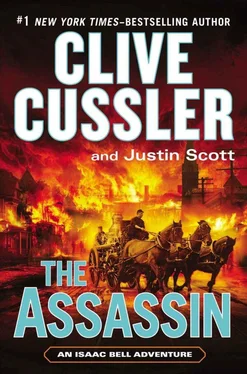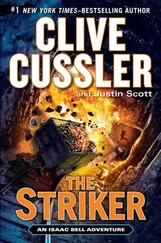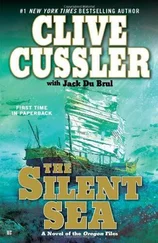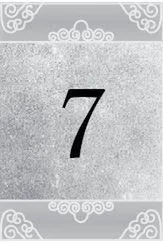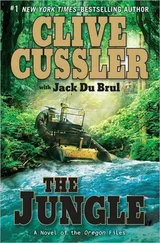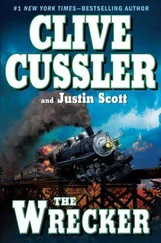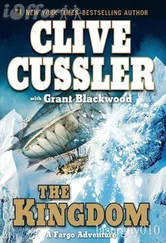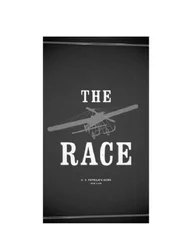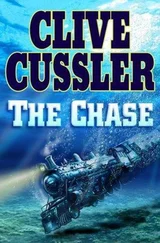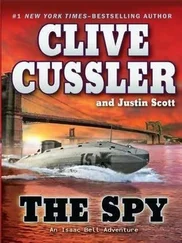An hour of buying drinks and eavesdropping in the Hotel de l’Europe’s bars and lobby confirmed Bell’s decision to base Rockefeller’s envoy disguise on the information Archie had turned up in Washington. The rumor repeated most anxiously said that the Shah of Persia had secretly borrowed fifteen million rubles from Czar Nicholas. That the loan might gain Russia’s Navy entrée to the Persian Gulf had Great Britain and the United States riled to the core.
John D. Rockefeller was thrilled. Beaming, he confided to Bell in one of the unguarded moments he had begun to offer up since his costuming in Paris, “Not one man in a hundred will keep his eye on the ball.”
He did not seem at all surprised by the rumors of the czar’s moneylending, and Isaac Bell concluded that he had probably known about the loan right down to the last ruble long before they left New York for Cleveland.
The assassin’s first and strongest inclination had been to masquerade as a Cossack. The pageantry and sheer spectacle of the savage warriors appealed, and there was great advantage to be had playing the role of a character who frightened ordinary folk. But Cossacks were so closely related by blood and clan that they knew one another, and all knew their place from a hundred traditions of tribal hierarchy.
To act the part of an aristocrat was almost as tempting. The privileged gratin of Russian society spoke French, which the assassin could understand, and were kowtowed to by everyone, especially soldiers and police. But aristocrats, too, were divided by impenetrable layers of rank. Who knew what superior you would accidentally insult?
Luckily, there was one sort that every Russian feared.
The lowliest peasant, the noblest aristocrat, the angry Tatar, the despised Armenian, the arrogant soldier, the brutal cop, the corrupt bureaucrat, all were terrified by the Okhrana, the czar’s secret police.
Plainclothes agents’ disguises ranged from the rubbernecking tourist to the city laborer. The assassin had observed that, however disguised, secret agents often betrayed themselves with a superior attitude. Lording it over people was no way for the czar’s spies to catch revolutionaries. That was their loss. But from the assassin’s point of view, pulling rank was a foolproof way to scare Russians into backing down and leaving you alone.
The riots, and the dread of worse impending, gave the disguise even sharper teeth. The government had put the Baku region in a state of chrezvychainaia okhrana , or “extraordinary security.” People dreading merciless sentences of prison and exile without a trial were doubly in terror of the Okhrana.
Head high and gaze contemptuous, brandishing a master rigger’s toolbox, the assassin brushed past the guards at the Nobel refinery gate. They were watching for armed Tatars, and not inclined to tangle with a plainclothes secret policeman masquerading in brand-new, too-clean overalls.
The derricks in the Baku fields were fireproofed with metal and Gypsolite sheathing and more densely positioned than in Kansas — stacked more like the crowded Los Angeles fields along Sunset Boulevard, with the accompanying smoke, fumes, stench, and noise. In all other aspects, they resembled those the assassin had studied. Steam engines powered the drill machinery, ladders ran up the sides, cables turned over crown pulleys, and the tops of the derricks were surrounded with parapet work platforms that made an ideal shooting perch.
The workmen tending the engines and the pumps looked away, hoping not to make eye contact that could lead to questions. Even the drillers deepening the wells with bit and casing — a much-tougher lot of men — averted their faces. The way was clear to choose an untended derrick that offered a clear field of fire yet was remote enough to allow an unimpeded escape.
The assassin found the right derrick along the shore of Baku Bay, which sheltered tank steamers, barges, and tugboats from the Caspian Sea. Its parapet commanded a perspective of the Baku road and the gate where traffic entered the refinery. The smoke made it hard to see, but wind gusts off the water stirred it sporadically, much as the Kansas wind had at Hopewell Field.
Safely ensconced high in the air with a panoramic field of fire, all that remained was to assemble the Savage, adjust the telescope, insert the clip, and wait for the so-called Special Envoy Joseph D. Stone, Standard Oil directing head Bill Matters, and supposed former Van Dorn detective Isaac Bell.
* * *
After months of instigating murder in the streets and homes set afire and property looted in hopes of distracting angry citizens from contemplating revolution — hopes largely realized — it dawned on the czar’s government that the European investors demanding stability were right to be alarmed. The Tatar pogromy against the Armenians was about to destroy Russia’s most valuable industry. So when Purest Incorporated executive Bill Matters and Special Commercial Envoy Stone drove to the Nobel refinery in Black Town, the Baku region prefect and the governor insisted on providing a powerful escort.
Cossack outriders in brilliant red uniforms crowned by tall sheepskin papakhi formed a cordon around their auto — a Cleveland-built, 24-horsepower Peerless Tonneau car — which caused Isaac Bell to elevate every nerve end to its highest state.
Surrounded by saber-wielding horsemen, the car’s rate of speed was limited to a brisk trot. At the same time, the glittering Cossacks pinpointed the exact location of the Peerless — itself a visual extravaganza of red enamel and polished brass — for a revolutionary with a pistol or a sniper drawing a bead.
Bell was not particularly concerned about a revolutionary getting past the Cossacks, and even if one managed to, the scuffle would give him plenty of time to blow the attacker’s head off with his Colt automatic. A sniper was a grimmer story, and Bell watched anxiously for a glint of smoke-darkened sunlight on a distant rifle. He could be stationed on a roof or in an attic window, at any height that presented a line of fire above the tall horsemen.
They moved out of the hotel and embassy districts, past Armenian neighborhoods of shuttered houses, and through slums where the Tatars, distinguished by their blue tunics, darker skin, and round faces, stared sullenly. The Cossacks’ faces hardened, their tension betrayed by stiffened backs and darting eyes.
Bell had befriended the chauffeur, Josef, a Georgian with a tall pompadour of wavy black hair and the furtive flicker in his coal-dark eyes of a police spy assigned to eavesdrop on the Americans. Josef explained in halting English that the Cossacks had new orders to stop the pogromy , to which they had been turning an officially sanctioned blind eye. Now they were the Tatars’ enemy. “Tatar shoot Cossack,” the Georgian flung cheerfully over his shoulder to Bell in the backseat. “Cossack shoot Tatar. Make peace.”
Bell glanced at Rockefeller beside him. The old man was looking everywhere with big eyes. “What splendid horses!” He seemed happy, almost joyful. Bell speculated that he was delighted that his Special Envoy disguise allowed him for the first time in decades to move about in public. Tatars were glowering at his police escort, not at the “most hated man in America.”
Whereas Bill Matters sat rigidly in the front seat next to the chauffeur, uncomfortable as he always appeared to be in Rockefeller’s presence. He did not appear nervous, although he was hardly at ease.
Bell was not quite sure what to make of him. As brusque and tough as he had found Edna and Nellie Matters’ father on first meeting, he had not seen real indications of the “hard as adamantine” that Spike Hopewell had characterized. Granted, the man had kept a cool head during the train attack. He was clearly accustomed to command. And it seemed that the former independent had effected a successful transition to what Rockefeller referred to as a “valuable executive.” But regardless of the high level of Standard Oil director or head of department the president had permitted him to rise to, Bell did not believe that Bill Matters had yet become “one of the boys” who ran the secretive trust.
Читать дальше
